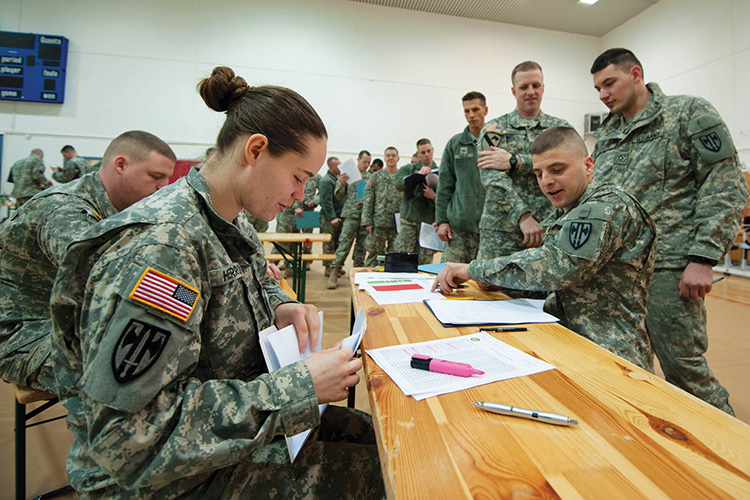
Pre-deployment is an emotional roller coaster for all involved. And the journey begins long before the service member leaves for their deployment.
The gut-wrenching roller coaster of pre-deployment is both mental and emotional. Service members must climb to the top of anticipation. Next, they must coast into a plateau of productivity and preparation. Finally, they must allow the realization to seep in and fall into their new (temporary) reality.

The Anticipation of Deployment (With a Side of Denial)
The early stages of pre-deployment happen before official orders have even dropped. These are the emotions of the slow climb. This stage is characterized by feelings of anticipation or even denial. Service members often grapple with the reality they’re deploying at all. Or they fear they will miss out on life at home.
At the same time, many feel eager to deploy, or overwhelmed by a sense of purpose.
This is usually where adrenaline kicks in as things become more official. Military members must complete time-sensitive tasks and focus on physical readiness. Pre-deployment emotions can lead to tension in relationships. This is very normal and usually caused by feelings of stress.

Some things to remember during this stage:
Unresolved tension can be detrimental before or during a deployment.
A distracted service member is also vulnerable. Tension at home can carry into work. Resolve conflict face-to-face, ahead of time.
Discuss expectations with your spouse or significant other.
Make sure everyone understands the timeline and the importance of preparation. During this time and deployment, contact may be limited. Talk about how you’ll navigate decisions, conflicts, emergencies, or other issues.
Schedule appointments in advance.
Now is the time to get your financials, family plan, life insurance, and will in order. Start preparing in tangible ways, especially if you have a spouse and/or children. Make sure your will, POA (power of attorney), and budget/finances are in order.

The Preparation (With a Side of Anxiety)
As the reality of deployment sinks in, many feel anxious. Continue preparing things such as home/family care plans and financial/legal plans. Preparation is likely to include a physical aspect. Many take part in increased unit training or additional fitness training.
Unfortunately, free time is often restricted more at this stage. Notice of a deployment can be months in advance or only a few weeks (or days!).
Some prefer a short-notice deployment—this means less time to worry. A shorter pre-deployment preparation isn’t easy. But it can lessen the pre-deployment anxiety for service members and their loved ones.

Some things to remember during this stage
Hold on to normalcy.
Deployment hasn’t happened yet. So resume normal life. Go out with friends. Lean into your family or your support system. Take this time to enjoy being present.
Don’t shut down.
Try not to alienate yourself or withdraw during this time. Those who love you want to help. Even if it’s difficult to process the roller coaster of pre-deployment for all involved.

The Feelings are Official
Orders are in. Dates are set and usually altered many times. Bags are packed. Most things that need to be done are done. Realization sinks in. The emotional and mental tension is building. There are tangible reminders everywhere and deployment is no longer a vague concept.
This stage can feel suffocating to service members’ families and loved ones. There is much concern, anxiety, and fear of the unknown. This may also be when the service member tells their children or close family members.
The roller coaster of pre-deployment is difficult for children. They can’t comprehend abstract concepts like adults. Set goals or even a trip to look forward to when you return. This will help everyone have something positive to look forward to.

Things to remember during this stage
Deployment details and dates should never be shared publicly.
Exact dates, locations, and other specific details of a deployment must stay confidential. Sharing this information can be a security risk to deployed service members.
Try making countdowns and visual displays for children.
“Deployment” and “separation” are difficult, vague concepts for children. Keep phrases simple. Try saying things like, “Daddy/Mommy is going away for work. They will be gone for X. We may not see them for a while. But we will see them through the computer/phone as much as we can and talk to them when we can.”
Write letters and draw pictures, even during the pre-deployment stage. Encourage children to talk through their feelings and provide lots of reassurance.
Allow yourself to process.
If you’re angry or scared, find healthy coping mechanisms to process these feelings. And if you’re excited to deploy, don’t feel guilty.

Adaptation and Resilience (With a Side of Wallowing)
And they’re off. Acceptance, resilience, and adaptability all occur during pre-deployment anxiety. So does wallowing. Daily life keeps moving. Time keeps ticking. And it’s okay to sit in the sadness some days. Remember, it’s never goodbye. it’s see you later.
So stay positive, but realistic. Adapt, but process. It’s okay to feel many things at once! The roller coaster of pre-deployment is overwhelming.
But what comes at the bottom of the pre-deployment roller coaster? A reunion with loved ones! Coming home to a supportive loved one is both a privilege and a relief.
About Military AutoSource
Built for and by the military, Military AutoSource provides a factory-direct program tailored to the unique circumstances and needs of military life. As the only Exchange and DoD authorized car-buying program, MAS is the exclusive military distributor and retailer for Audi, Chevrolet, Chrysler, Dodge, Ford, Honda, Jeep, Lexus, Lincoln, Nissan, Ram, Toyota, Volkswagen vehicles and Harley-Davidson bikes.
Through our program service members stationed or deployed overseas can purchase a new or pre-owned vehicle for delivery in the US or to more than 50 overseas duty locations. Learn more about your overseas U.S. Military car-buying benefits.




